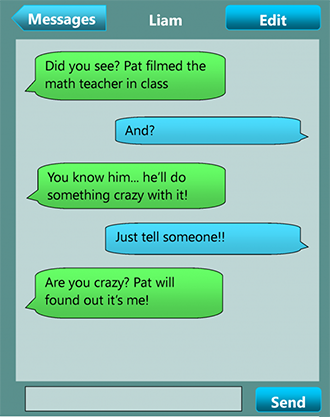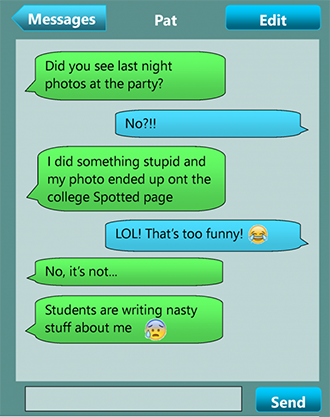CyberSelf.ca: A Website to Provide Students with Tools to Sensitize and Make Them Responsible for Their Use of Social Media
Important !
As of fall 2022, the cyberself.ca website is no longer accessible. To learn more about digital citizenship, consult The Little Guide to Being an Ideal Applicant.
What is a cyber-reputation? How can you recognize a case of cyberbullying? How can you prevent the occurrence of unpleasant off-line meetings? What should a victim of identity theft do? These are the types of questions that CyberSelf.ca (a website designed and developed by the IT Representative’s Network) seeks to answer. The site is a reference tool for students, but also for teachers or other college stakeholders that wish to sensitize students to the risks involved with the use of social media.
Why Was CyberSelf.ca Created?
Technology has changed our relationship with knowledge, but it has also modified our ways of communicating and collaborating with each other. Just think about the constant use of social media by our students, whether it be in their private life or as part of their studies.
We regularly hear about cyberbullying cases, with people whose reputations are seriously affected by compromising photos or shocking remarks. Someone might also fraudulently use our personal information or be accosted during an off-line meetup after an appointment has been arranged through the Internet. No one is completely safe from these situations, which is why it is so important for students to protect their on-line presence, but also that of others, including that of their teachers.
Who Was CyberSelf.ca Created For?
Above all else, CyberSelf.ca seeks to inform students, providing them with tools to help them act responsibly when they use social media and on-line communication:
- What risks are associated with the use of social media?
- How do you prevent these situations or respond when they happen?
The site can also be used by teachers or other members of the college community as a framework for developing pedagogical or sensitization activities.




Examples of an exchange of text messages on CyberSelf.ca
What Can You Find at CyberSelf.ca?
The CyberSelf.ca website offers resources related to the risks associated with using social media. It also offers resources for the prevention of certain situations, and how to take action, should the need arise. Its content is linked to Objective 5.3 of the ICT Profile for College Students, namely Ensure the Security of Digital Information as well as Objective 5.4 Act in an Ethical and Civil Manner. These are essential skills that the student should develop as part of their academic, professional or civic lives.
CyberSelf.ca draws from four situations of risk that can happen when using social media or other forms of on-line communication:
- Cyberbullying
- Off-line meetings
- Cyber-reputation and the right to one’s own image
- Identity theft
For each risk, the following information is detailed:
- What it is: This section defines the risk and presents potential consequences, whether for oneself or others.
- Recognizing the situation: Here you will find “real-life situations” that how the risks may come to pass in different ways.
- Prevention: This section identifies ways to prevent the risk.
- Taking action: This section offers solutions that allow you both to deal with the situation and to resolve it. Whatever the risk may be, the student is encouraged to contact Student Services at their college.
There are also informative videos and a Toolbox that enhance the information and allow users to better understand the issues related to the risks.
Protect Your Cyber-reputation and That of Others is one of the videos you will find on the CyberSelf.ca web site.
During the process of creating the content for the website, the team that developed the site thought about the following dimensions related to the use of social media:
|
|
It is easy to find information about me on the Internet. By gathering this information together, people could make true or false assumptions of who I am. What impression would a future employer have of me after a research? |
|
|
Oops, I made a mistake. Even if I try to erase the message, someone has already transferred it to another person. I can’t seem to be able to destroy the information that is given when a search is done on me. How long will this information be available for? |
|
|
When I publish a group picture, I also involve my friends. When I write on a topic, it can also involve my family, my school or my employer. What I do can have an impact on people around me. |
|
|
Access to the whole world is now very easy. Maybe too easy. With only one click, we may, without even realizing it, be read and seen by people from around the world. |
The team will present the French version of the CyberSelf.ca web site (MonImageWeb.com) at the 2016 AQPC Symposium. Participants will be invited to discuss the content of the web site and potential use cases for the classroom or within the college in general.
The current CyberSelf team consists of:
- Daniel Bourry (Cégep de Vieux Montréal)
- Bernard Gagnon (Cégep de Saint-Félicien)
- Martin Pelletier (Cégep Régional de Lanaudière à Terrebonne)
- Nicole Perreault (IT Representatives Network)
- Julie Anne Roy (LaSalle College)
- Lisa Tremblay (Cégep Ahuntsic)
Thanks to the following people who also participated:
- Guy Germain (Cégep Bois-de-Boulogne)
- Jules Massé (Institut de tourisme et hôtellerie du Québec – ITHQ)
- Marie-Josée Desrochers (Collège de Rosemont)
Thanks as well to extended members of the team:
- Valérie Biron (Direction des affaires juridiques, Fédération des cégeps)
- Line Coulombe (Direction des affaires étudiantes, Ahuntsic)
- Mathieu St-Onge (Direction des communications, Fédération des cégeps)
- Odile Simard and Jean Collin (Enquêtes Forensik Inc.)

 Me
Me Terms
Terms Us
Us Extent
Extent